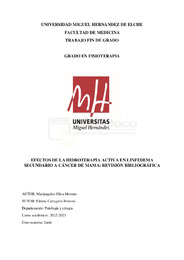Por favor, use este identificador para citar o enlazar este ítem:
https://hdl.handle.net/11000/30086Registro completo de metadatos
| Campo DC | Valor | Lengua/Idioma |
|---|---|---|
| dc.contributor.advisor | Cartagena Brotons, Fátima | - |
| dc.contributor.author | Oliva Moreno, Mariángeles | - |
| dc.contributor.other | Departamentos de la UMH::Patología y Cirugía | es_ES |
| dc.date.accessioned | 2023-11-09T11:01:46Z | - |
| dc.date.available | 2023-11-09T11:01:46Z | - |
| dc.date.created | 2023-06-16 | - |
| dc.identifier.uri | https://hdl.handle.net/11000/30086 | - |
| dc.description.abstract | Introducción: Atendiendo al progreso en el tratamiento y la supervivencia del cáncer de mama hay un aumento de las patologías asociadas al mismo, como lo es el linfedema secundario. Afecta a millones de personas en el mundo y no existe un protocolo de actuación estandarizado en la evidencia. Objetivo: El objetivo de esta revisión es analizar la evidencia científica sobre los efectos de la hidroterapia en pacientes que sufren linfedemas asociados al cáncer de mama. Metodología: Para ello, se ha realizado una búsqueda en diferentes bases de datos como PubMed, PEDro, Web Of Science y Scopus, de donde se han obtenido 7 artículos. Todos ellos son ensayos clínicos válidos para su posterior revisión. Resultados: Lo observado en los artículos incluidos no muestran unanimidad en los efectos relacionados con el volumen del linfedema y el rango de movimiento de hombro, no obstante, se ha observado que la calidad de vida, adherencia y el dolor mejoran con la práctica de la hidroterapia. Conclusiones: La hidroterapia podría llegar a ser una gran herramienta en el tratamiento de esta patología. Sin embargo, se necesita más investigación para determinar de manera más clara los efectos y el protocolo a seguir. | es_ES |
| dc.description.abstract | Introduction: Taking into account progress in the treatment and survival of breast cancer, there is an increase in pathologies associated with it, such as lymphedema secundary. It affects millions of people around the world and there isn’t a standardized protocol of action on evidence. Objective: The objective of this review is to analyse the scientific evidence on the effects of hydrotherapy in patients who suffer from lymphedemas associated with breast cancer. Methods: For this, a search has been carried out in different databases such as Pubmed, PEDro, Web Of Science and Scopus, from which 7 articles have been obtained. All of them are valid clinical trials for later review. Results: What was observed in the included articles does not show unanimity in the effects related to the volume of lymphedema, and the range of movement of the shoulder, nevertheless, it has been observed that the quality of life, adherence and pain improve with the practice of hydrotherapy. Conclusion: Hydrotherapy could become a great tool in the treatment of this pathology. However, more research is needed to determine more clearly the effects and the protocol to be followed. | es_ES |
| dc.format | application/pdf | es_ES |
| dc.format.extent | 35 | es_ES |
| dc.language.iso | spa | es_ES |
| dc.publisher | Universidad Miguel Hernández de Elche | es_ES |
| dc.rights | info:eu-repo/semantics/openAccess | es_ES |
| dc.rights.uri | http://creativecommons.org/licenses/by-nc-nd/4.0/ | * |
| dc.subject | linfedema asociado a cáncer de mama | es_ES |
| dc.subject | hidroterapia | es_ES |
| dc.subject | terapia acuática | es_ES |
| dc.subject.other | CDU::6 - Ciencias aplicadas | es_ES |
| dc.title | Efectos de la hidroterapia activa en linfedema secundario a cáncer de mama: revisión bibliográfica | es_ES |
| dc.type | info:eu-repo/semantics/bachelorThesis | es_ES |

Ver/Abrir:
TFG. MARIANGELES OLIVA MORENO.pdf
1,97 MB
Adobe PDF
Compartir:
 La licencia se describe como: Atribución-NonComercial-NoDerivada 4.0 Internacional.
La licencia se describe como: Atribución-NonComercial-NoDerivada 4.0 Internacional.
.png)